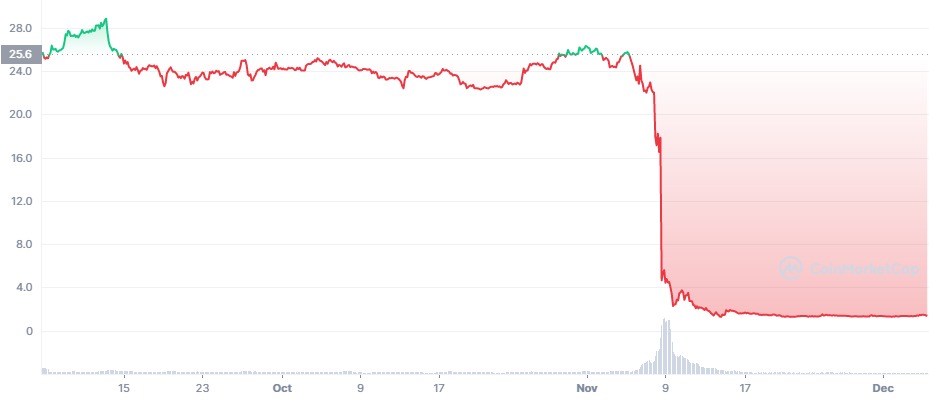FTX: What happened and what’s next?
If you’ve turned on the news in the past month, you were probably privy to an onslaught of information and headlines regarding the bankruptcy of a significant cryptocurrency exchange called FTX. While the entire story is too complex to review in this piece, we will attempt to distill the high points and help you sort through the noise.
What might be marked as this generation’s Lehman/Madoff/Enron moment, Sam Bankman-Fried’s empire of FTX, once worth upwards of 32 billion dollars, has virtually cratered into obsolescence in a matter of days. While the situation and details are still ongoing, the reports surrounding the case are quite startling and provide a cautious tale for all who think cryptocurrency and the decentralized world are the future of finance.
The situation was so bad that as FTX declared bankruptcy, a new CEO, John Ray III, was appointed. If the name sounds familiar, that’s because he was the same person who oversaw the liquidation of Enron in 2001. In John’s own words regarding FTX, “Never in my career have I seen such a complete failure of corporate controls and such a complete absence of trustworthy financial information as occurred here.”1

Sam Bankman-Fried, FTX Founder (Source: Tom Williams/Getty Images)
Who is Sam Bankman-Fried?
Sam is the son of two Stanford law professors (who also specialize in compliance law). After graduating from MIT, he quickly founded a trading firm called Alameda Research in 2017 and soon after founded FTX in 2019. Using the rise of cryptocurrency, he created an empire to show everyone he was the world’s next JP Morgan (according to Jim Cramer). In addition to creating these empires, he was further tapped by several prominent venture capital firms such as Softbank and Sequoia, validating his rise to stardom in a new industry that had lots of promise. With this, he started using his wealth to further his personal agenda. He became the second largest donor to the Democratic Party, lobbying before Congress his own set of regulations that could help shape the crypto industry.
So, What Happened?
In early November, rumors started to circulate that Alameda Research had a significant amount of capital in FTT, a proprietary cryptocurrency token created by parent company, FTX. This token, which was also owned by other large companies and retail investors, gave holders perks on the FTX exchange ranging from lower trading fees to yield for holding the token over time. Shortly after, another large cryptocurrency exchange and rival, Binance, came out publicly, stating they were going to liquidate their holdings in FTT. Like clockwork, the price of the FTT token started to crater immediately as the market reacted to the news.
Looking at the image below, you can see how quickly the price of FTT fell from $25 a token to $6. Binance announced they had reached an agreement to purchase FTX, pending due diligence. The following day, a spokesperson from Binance told reporters they would no longer be pursuing the acquisition of FTX due to concerns over mishandled customer funds and alleged investigations into the business from US regulators.
Concurrently, as the company continued to crater from overleveraged exposure to FTT, Alameda and other related subsidiaries were forced to close their doors as it became apparent that Sam’s empire was built on a house of cards. If all that damage wasn’t enough, FTX was hacked for an additional $300 million by an unknown third party. Bankman-Fried blamed an ex-employee, but there is no proof of what happened. Finally, Reuters reported that up to $1 billion of customer funds were completely unaccounted for.

The price of FTT2
What Now?
The situation is still unfolding, and new information is coming out daily as bankruptcy proceedings and public debriefings are underway.
What was once touted as a significant player and “safe” custodian of cryptocurrency assets, FTX, turned out to be smoke and mirrors. They lacked proper organizational structure, little oversight, minimal risk controls, and didn’t track where incoming money was going. Even their independent auditor is located in the metaverse!
Leverage, greed, and power, mixed with the fear of missing out, resulted in a quick but detrimental situation. Whether it is the Dutch tulips in the 1600s, Japan in the 1980s, or the Dot Com bubble in the ’90s, if it sounds too good to be true, it usually is. Every generation needs to learn its lesson the hard way.
This is a good reason why we invest in public securities, backed by regulation, that are liquid and traded on an exchange. Due diligence can be performed easily, and they have an easy-to-understand business model. Over the decades, we continue to be amazed at the perpetual chase for get-rich-quick schemes. The right way to do it is to play the long game, staying transparent and liquid.

Andrew Cialek, CFP®
2https://coinmarketcap.com/currencies/ftx-token/
The views expressed in this commentary are subject to change based on market and other conditions. These documents may contain certain statements that may be deemed forward‐looking statements. Please note that any such statements are not guarantees of any future performance and actual results or developments may differ materially from those projected. Any projections, market outlooks, or estimates are based upon certain assumptions and should not be construed as indicative of actual events that will occur. The information provided does not constitute investment advice and should not be relied on as such. It should not be considered a solicitation to buy or an offer to sell a security. It does not take into account any investor’s particular investment objectives, strategies, tax status, or investment horizon. You should consult your attorney or tax advisor. Principle Wealth Partners LLC is a registered investment advisor. Advisory services are only offered to clients or prospective clients where Principle Wealth Partners and its representatives are properly licensed or exempt from licensure. For additional information, please visit our website at https://principlewealthpartners.com.
